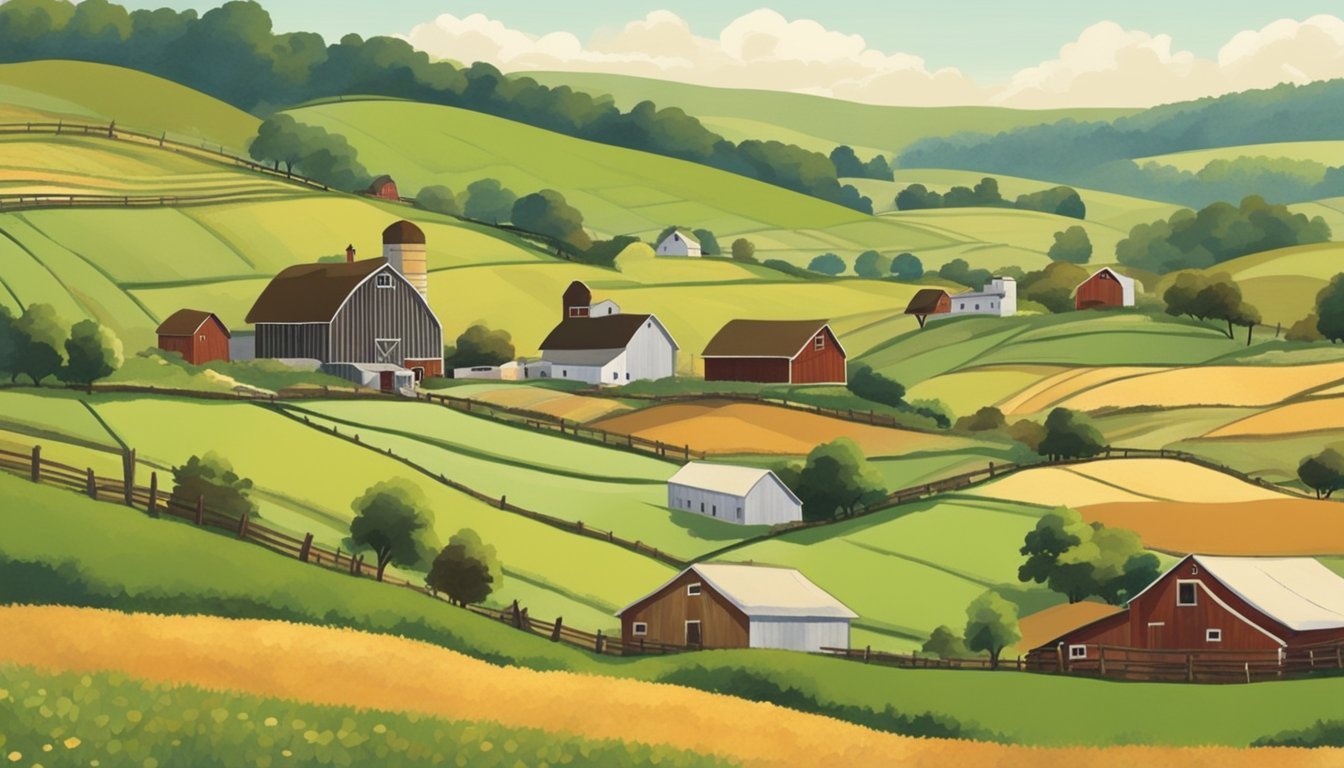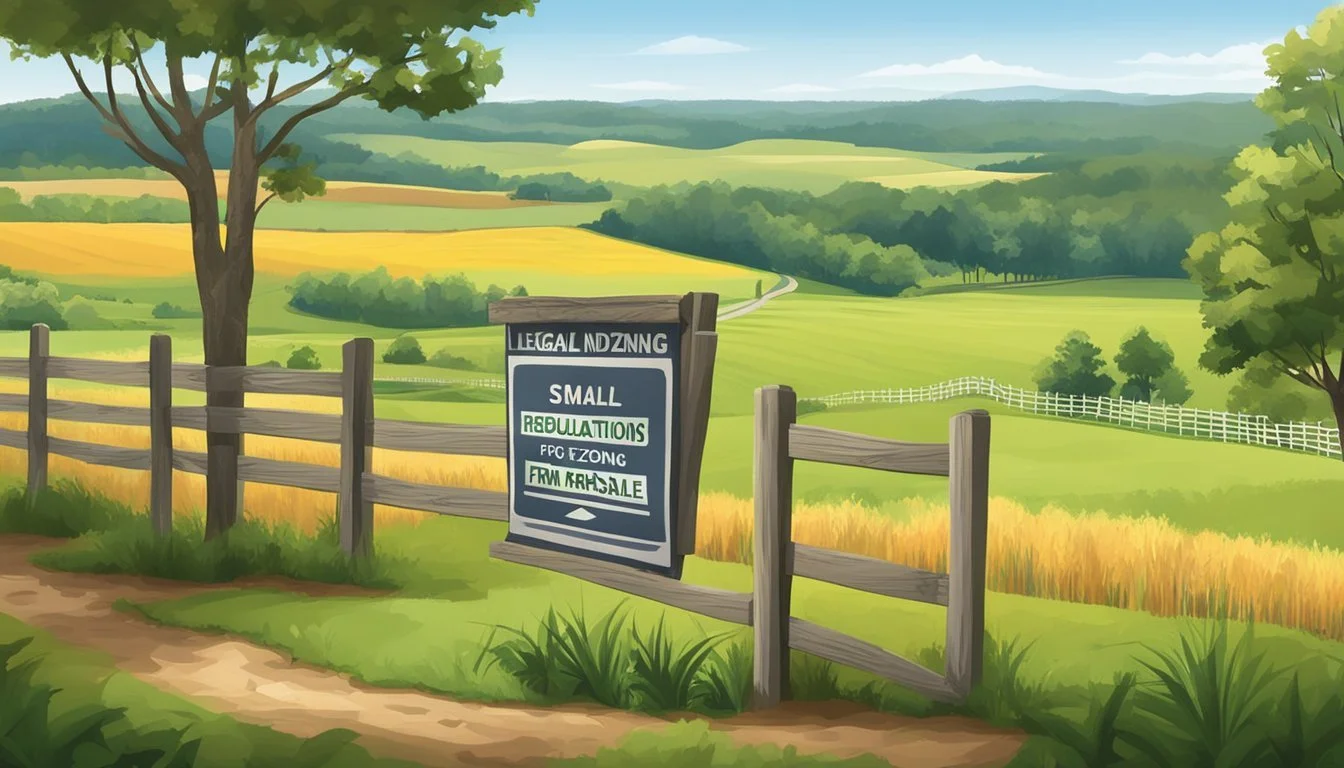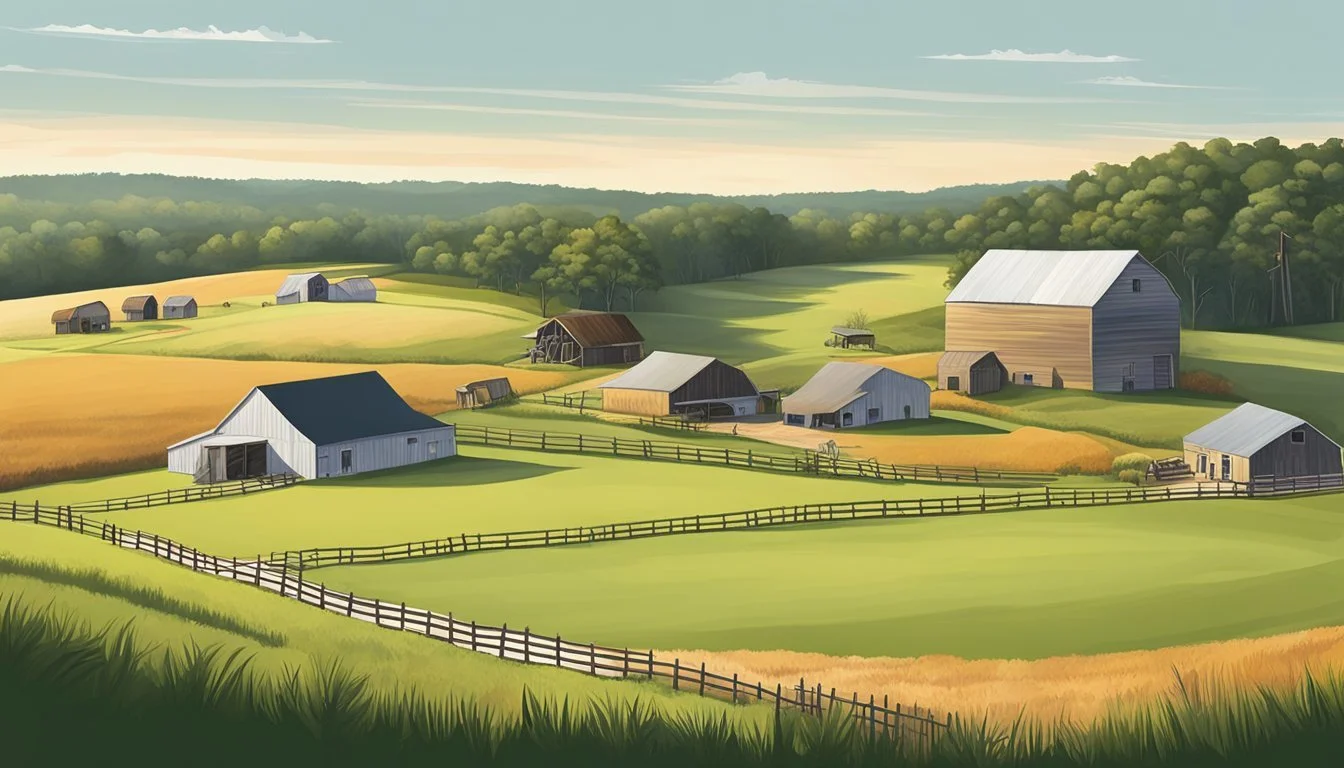Small Farms for Sale in South Carolina
Your Guide to Finding the Ideal Homestead
This Article is Part of State-by-State Guide to Buying Your First Small Farm
South Carolina, often celebrated for its lush landscapes and agricultural heritage, offers a diverse array of small farms for sale. These properties range from hobby farms suited for personal use to larger ranches and farmettes that cater to a variety of agricultural pursuits. Small farms across the state feature various facilities, types of land, and local amenities, making them attractive to those looking to embrace a rural lifestyle or expand their farming endeavors.
As the market for small farms in South Carolina grows, prospective buyers can find properties that match their specific needs, whether it's for cultivation, livestock, or a combination of both. Filters for size, location, and types of land enable an efficient search for the ideal farm. Available properties are found across the state's distinct regions, from the rolling hills of the Upstate to the serene flatlands of the Low Country.
With the availability of detailed property listings, including photos, maps, and extensive features, potential farm owners can thoroughly explore options before making a decision. Moreover, the integration of virtual tours and videos has enhanced the remote purchase experience, ensuring that buyers can get a comprehensive view of the land and its capabilities. Hence, with the right resources, individuals and families can locate a small farm in South Carolina that fits their agricultural aspirations and lifestyle preferences.
Understanding the South Carolina Farm Market
In South Carolina, the farm market caters to a diverse range of buyers, featuring properties of varying sizes and types, each with its unique pricing structure, influenced by location, land quality, and amenities.
Types of Farms Available
The South Carolina farm market offers a variety of farm types, including traditional row crop lands, livestock ranches, and specialty farms such as equestrian properties. Notably, small farms dot the landscape, particularly in regions like the Low Country and Upstate South Carolina, reflecting the state's agricultural heritage.
Row Crop Farms: These farms are designed for the cultivation of crops like corn, soybeans, and cotton.
Livestock Ranches: Targeting the raising of animals such as cattle or poultry.
Specialty Farms: Including equestrian centers, organic operations, and agri-tourism ventures.
Average Farm Size and Pricing
Farm sizes in South Carolina vary significantly, from small-scale plots to extensive acreages. Pricing is just as varied, often determined by the farm's size, location, and available facilities.
Size: Farms available for sale range from a few acres to over 40 acres.
Pricing: Listings show a minimum auction price as low as $1, with some properties valued up to $1,950,000.
Type Acres $ Min $ Max Small Farms Min: 21 $1 $1,950,000 Larger Plots Max: 44 Varies Market Value
Note: The table offers a snapshot of the market but does not represent complete listings.
Financial Considerations for Buyers
When considering the purchase of a small farm in South Carolina, buyers need to evaluate various financial aspects. These include understanding the different financing options available, the potential for owner financing and foreclosure situations, as well as analyzing the current market's price per acre.
Financing Options for Farm Purchases
Prospective buyers should investigate traditional loans from banks and agricultural lenders, as these usually offer a range of mortgage products specifically tailored for farm purchases. Government programs, such as those offered by the USDA, can provide favorable terms like lower down payments or reduced interest rates. It's imperative that buyers compare terms from various lenders to find the most advantageous financing arrangement.
Owner Financing and Foreclosures
Owner financing can be a viable alternative for buyers and sellers. In this arrangement, the seller acts as the lender, providing a loan directly to the buyer. This can often offer more flexible terms than traditional lenders. Additionally, buyers may find opportunities in foreclosed properties, which can sometimes be acquired below market value. However, buyers need to be aware of the higher risk and potential for additional expenses in bringing a neglected property up to standard.
Price Per Acre Analysis
The price per acre in South Carolina varies significantly based on location, land quality, and available amenities. Based on the aforementioned search results:
Average listing price: $361,348
Average price per acre: $24,440
Buyers should note that these figures can greatly fluctuate. The maximum price per acre ($ / ac max) that a buyer is willing to spend will largely depend on the intended use of the farm and its potential for revenue generation. Rarity of certain property features can also drive up per-acre prices.
Legal and Zoning Regulations
When purchasing small farms in South Carolina, understanding the state's zoning laws and property restrictions is crucial. They determine how a property can be used and any specific agricultural requirements.
Understanding Zoning Laws
South Carolina's agricultural real property is defined under the Code Sections 12-43-220(d), 12-43-230, and 12-43-232. It requires a tract of real property to be primarily used for agricultural purposes. Zoning laws may vary by county, so it is essential to verify whether a property is zoned for agricultural use and to what extent farming activities are permissible.
Status: The current zoning status must align with the intended use for agriculture.
Minimum Acreage (ac min): Some counties impose a minimum acreage requirement to qualify for agricultural zoning and related tax benefits.
Maximum Acreage (ac max): While there may not be a stated maximum, large tracts may be subject to different regulations or taxes.
Property Rights and Restrictions
Property rights are subject to local ordinances and state regulations. For example, Title 46 of the South Carolina Code of Laws addresses various aspects of agricultural operations, including nuisance suits related to agricultural activities.
Easements and Rights-of-Way: Review any existing easements that might affect farming operations or property development.
Environmental Restrictions: Certain farming practices may be restricted to protect the environment and adhere to state agricultural regulations.
Purchasers must inquire about these legal frameworks before buying to ensure their compliance and to safeguard their investment in South Carolina's agricultural land.
Farm Property Types and Uses
In South Carolina, farm properties are varied, each offering unique opportunities for living and agricultural production.
Residential vs. Commercial Farm Properties
Residential farm properties are typically characterized by their primary use as a dwelling place with the land supporting small-scale agriculture. These properties often include a residence, ranging from modest homes to larger, family-sized dwellings. For instance, in Aiken County, one may find a 3,100 square foot home situated on 12.6 acres of land.
Commercial farm properties, on the other hand, are generally larger and focus on agricultural production as a business. These farms may include facilities like barns, processing plants, and expansive tracts of land dedicated to crops or livestock. Commercial farmland can go up to hundreds of acres, as seen with a 40.5-acre property in Windsor, SC that is equipped for larger scale operations.
Land Use and Crop Suitability
The soil composition and climate of South Carolina vary, influencing land use and the types of crops that can be successfully cultivated. Certain areas, such as the Upstate region, are conducive to growing a variety of crops due to their fertile soil, while the Low Country is known for its historic rice (how long does rice last?) fields.
Soil Suitability: Some regions within Greenville County, which span 26 acres, may support diverse agricultural activities due to the ease of soil management.
Climate Impact: A 19-acre property in Islandton, SC, might be suitable for both agriculture and livestock, considering the local climate's ability to support year-round farming.
Properties must comply with zoning regulations that designate specific uses, impacting the type of farming that can be conducted. Crop suitability also ties into market demand, with commercial farms often producing what is likely to be profitable in the current market.
Searching for the Right Farm
When seeking small farms for sale in South Carolina, it's crucial to assess not only the location and soil quality but also the infrastructure and accessibility to ensure that the property meets your farming and lifestyle needs.
Evaluating Location and Soil Quality
The location of a farm determines the climate, culture, and community interactions one will experience. South Carolina's geography varies from the Blue Ridge Mountains in the Upstate region to the sandhills and Atlantic coastal plain, which can greatly influence the farm's environment and productivity. For small farms, soil quality is essential to sustain crops and livestock. Prospective buyers should consider conducting soil tests to assess fertility and potential for crop success.
Upstate Region: Dominated by rolling hills and favorable for a variety of crops.
Low Country Region: Known for its rich, silty soil excellent for rice and historic crop plantations.
Pee Dee Region: Features loamy soil suitable for tobacco, soybeans, and cotton.
Midlands Region: Often consists of sandy soil, requiring careful management for successful cultivation.
Infrastructure and Accessibility
Considering the farm's existing infrastructure is a deciding factor in its potential for efficiency and expansion. Buildings, water systems, fencing, and roads contribute significantly to the functionality of the farm.
Key Infrastructure to Evaluate:
Housing: Quality and size of residential structures.
Barns/Sheds: Adequacy for storage and livestock.
Irrigation Systems: Assessment of water resources and distribution.
Fencing: Existing perimeters and their condition.
Accessibility to markets, suppliers, and transport routes plays a pivotal role for farms to thrive economically. Direct routes to local markets and proximity to suppliers for farm inputs can influence a farm's profitability and operational efficiency. Farms located near main roads benefit from easier logistics, while remote locations may present challenges.
Accessibility Considerations:
Proximity to Markets: Distance to local farmers markets, co-ops, or direct buyers.
Transport Routes: Access to major roads or highways for product distribution.
Supplier Distance: Ease of obtaining seeds, equipment, and other essentials.
Negotiating the Purchase
When purchasing a small farm in South Carolina, it's crucial to understand the nuances of making an offer and navigating the final stages of the transaction. Clarity and preparedness at each step can significantly influence the outcomes of the negotiation process.
Making an Offer
An offer on a small farm should be based on thorough research and understanding of the property's market value. Buyers should consider recent sales of similar properties in the area, known as comparables, as these provide a benchmark for pricing. A written proposal should include the following:
Sale price: The offer amount that a buyer is willing to pay for the farm.
Terms: Conditions under which the buyer is purchasing, such as cash or financing.
Contingencies: Clauses that allow the buyer to back out of the contract under specific circumstances, such as financing falling through or unsatisfactory inspection results.
Deposit: A good faith amount, often around 1-2% of the purchase price, to signal serious intent.
Inspections and Closing the Deal
After the seller accepts an offer, the following steps should be undertaken before closing:
Inspections: These are critical to ensure there are no hidden issues with the property. Buyers often request:
Structural inspection: To check the integrity of buildings.
Land survey: To verify property boundaries and acreage.
Environmental tests: Where necessary, to check for contaminants or soil quality.
Water system tests: To ensure water sources are safe and sustainable.
Appraisal: Lenders will require an appraisal to confirm the property's value before financing the purchase.
Closing: This final step involves:
Reviewing and signing closing documents.
Paying closing costs, which can include loan origination fees, attorney's fees, and title services.
Transferring the title of the property from the seller to the buyer.
Careful attention should be given to the details of the purchase agreement and closing paperwork to avoid any future disputes or legal complications.
Future Considerations
When exploring small farms for sale in South Carolina, potential buyers should consider the implications of ownership transition and the factors influencing long-term investment potentials.
Preparing for Ownership Transition
Prospective buyers must diligently assess the farm's operational history, current condition, and any outstanding liabilities or encumbrances that may affect ownership transfer. They should engage with agricultural attorneys or real estate experts specializing in farmland to navigate the complexities like zoning regulations and property rights associated with farm transactions.
Long-Term Investment and Resale Value
Investing in a farm is a long-term commitment that must account for the volatility of agricultural markets and the evolving trends in rural land values. Buyers should analyze local market data for similar properties and consider:
The land's potential for appreciation, guided by factors such as location, soil quality, and water access.
Opportunities for diversifying income through alternative crops, agritourism, or leasing parts of the land.
The farm's adaptability to future agricultural advancements and sustainability practices, which can enhance its long-term viability and attractiveness to future buyers.






